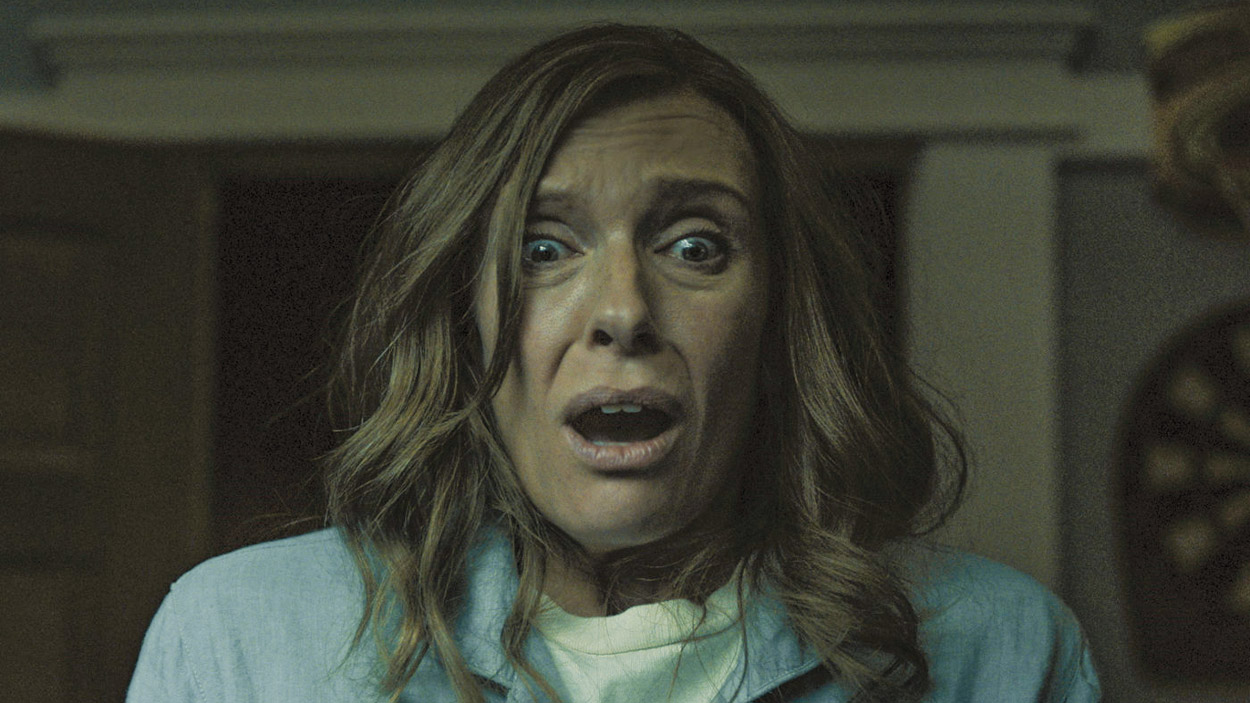Mental illness begets mental illness, tragedy begets tragedy, and grief begets grief: That slow-rolling, rapidly accumulating snowball of negative psychic energy sits at the heart of writer-director Ari Aster’s art house horror Hereditary. The story centers on highly emotional wife, mother and artist Annie Graham (Toni Collette from Muriel’s Wedding, The Sixth Sense and Little Miss Sunshine). Annie dreams of getting out from under the thumb of her domineering and unstable mother. But when mom finally passes away, Annie’s family is plagued by a string of increasingly horrific incidents. Aster’s pitch-black domestic chiller has already garnered a great deal of praise coming off its successful film festival run. The Playlist called it “a remarkable, triumphant and confident picture.” Time Out New York said the film “takes its place as a new generation’s Exorcist.” Making that praise even more impressive is the fact that Hereditary is Aster’s first feature film. The young filmmaker used to live in New Mexico, graduated from The College of Santa Fe and was, for a time, one of the regular film writers for Weekly Alibi.Naturally, we couldn’t pass up a chance to chat with our old colleague and congratulate him on his sudden, well-deserved success. You last wrote for Alibi back in 2004, contributing a number of feature film reviews. What else added to your film education here in Albuquerque?I studied film at the College of Santa Fe, which is now the Santa Fe University of Art and Design. I approached you, back then, to see if you would be into me writing a couple of reviews for the Alibi. And you very generously gave me that space. I was working toward being a filmmaker, but I’ve always been a really committed cinephile, and I was excited by the idea of writing reviews. When I was in Albuquerque, I would make sure to see everything at The Guild. I love those guys at The Guild. And Alphaville, the videostore. Long gone, but sorely missed.So what have you been up to, in a nutshell, since then?After College of Santa Fe, I went to the AFI [American Film Institute] Conservatory [in Hollywood] where I studied directing. I graduated and got my MFA and made a lot of shorts and wrote a lot of feature screenplays, hoping to get one of them off the ground. Hereditary proved to be the first one.Hereditary is a very original film, extremely hard to categorize. I don’t envy myself just trying to write a capsule description. How in the world did you pitch such an unconventional work to studios?One of the ways I described it, when I was trying to find financing, was simply as a family tragedy that curdles into a nightmare—in the same way that life can feel like a nightmare when things are falling apart. I feel like the film almost owes a greater debt to the domestic melodrama than it does to the horror genre, in the way that it hopes to honor the extreme emotions that the characters are going through. It is a film about people suffering, and I hope this is a film that takes suffering seriously.I never really ask people what their direct inspiration is. But I like to wonder: If Hereditary were in an old-school video store, what would it be on the shelf next to?I think it belongs on the shelf next to Rosemary’s Baby and Don’t Look Now and maybe Jack Clayton’s The Innocents. Ingmar Bergman’s Cries and Whispers. Maybe In the Bedroom.As I was watching, I thought of Rosemary’s Baby and Don’t Look Now and maybe John Schlesinger’s The Believers—stories in which the characters are rooted in a very realistic world and aren’t inclined to believe in or cross paths with any kind of horror or supernatural elements. And yet, as you say, the story curdles into that anyway. Right. It was important to me for the film to function as a family drama before I attended to any of the horror elements. But it is, in the end, unabashedly a horror film.How does a first-time feature filmmaker lure big-name actors like Toni Collette and Gabriel Byrne to their indie project?I was fortunate. I sent the script to Toni Collette with a letter, and she responded to it. We met for lunch, and she attached herself. And once an actor of that caliber comes on to a film, adds her power, that will do it. That’s really what got the train moving on the tracks. So I’ll always be grateful to her for coming on with the film, because that’s how we were able to get actors like Ann Dowd and Gabriel Byrne. And we were able to get the budget we needed. Yeah, I definitely recognize what a coup it was to get them. Your father actually dropped by the Alibi offices a couple weeks back. We ran a preview of Hereditary in our Summer Film Guide, and he wanted some extra copies to show friends. I’m assuming, from that, that your family is pretty nice and well-grounded. Where, then, does the self-destructive, inner-demon-haunted Graham family come from?My parents are incredibly supportive. They’re both artists. My mom is a brilliant poet who is also a brilliant visual artist. And my dad is a jazz drummer, an R&B drummer. So I grew up in a family of artists and they’ve been incredibly supportive. I think that one of the reasons I’m able to work with such dark material is because I’ve never been made to question what I’m doing by them. They’ve always encouraged me and supported me. I’m just incredibly fortunate.
Hereditary opens in theaters nationwide this Friday.

